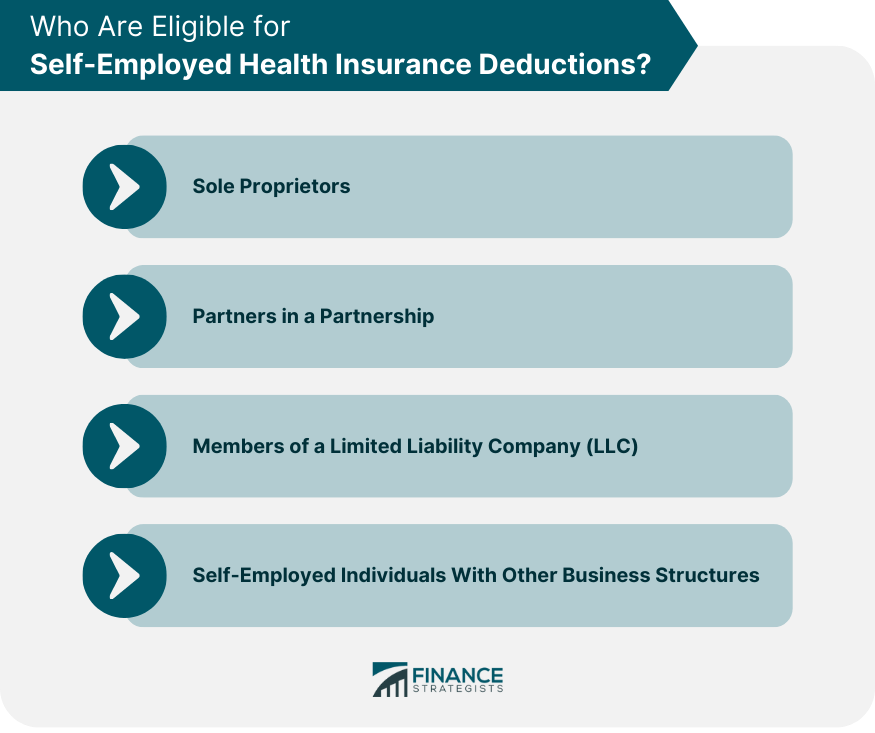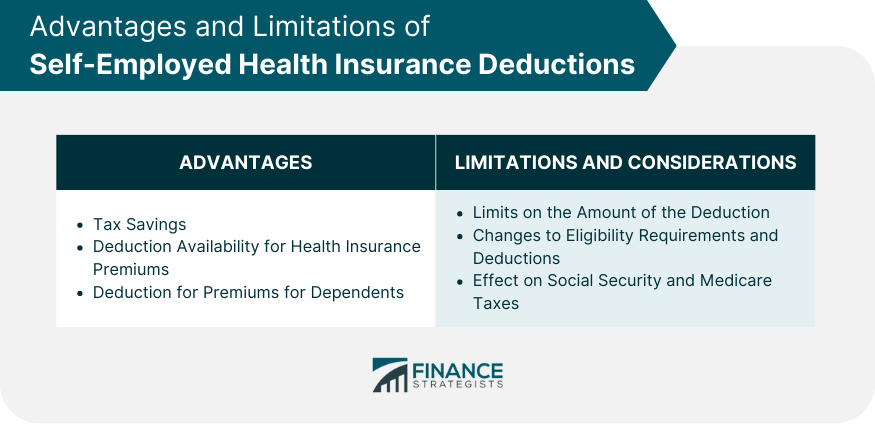Self-employed health insurance deductions refer to tax deductions that self-employed individuals can claim for the premiums they pay on health insurance policies. These deductions are designed to reduce the taxable income of self-employed persons, thus lowering their overall tax liability. Understanding self-employed health insurance deductions is essential for self-employed individuals, as these deductions can significantly impact their financial situation. By taking advantage of these deductions, self-employed individuals can potentially save money on their taxes and ensure that they have access to affordable health coverage. Sole proprietors are self-employed individuals who own and operate a business as a single person. They are eligible for health insurance deductions as long as they have a net profit from their business and are not eligible for an employer-sponsored health insurance plan. Partners in a partnership are eligible for self-employed health insurance deductions if they have a net income from their partnership and are not eligible for an employer-sponsored health insurance plan. The partnership must have a net profit and the partner must have a share of that profit in order to qualify for the deduction. Members of a limited liability company (LLC) are also eligible for self-employed health insurance deductions. Similar to partners in a partnership, they must have a net income from the LLC and not be eligible for an employer-sponsored health insurance plan in order to qualify for the deduction. Other self-employed individuals, such as those operating under an S-corporation, may also be eligible for health insurance deductions. Eligibility requirements for these business structures can be more complex, and it is important to consult with a tax professional to determine eligibility. To qualify for self-employed health insurance deductions, individuals must provide documentation of their health insurance premiums, such as invoices or receipts. Additionally, they must provide proof of their self-employed status, such as business income and expenses reported on their tax return. The self-employed health insurance deduction is calculated based on the premiums paid for health insurance policies during the tax year. The deduction cannot exceed the individual's net income from self-employment. It is also important to note that the deduction is limited to the portion of premiums paid for the individual and their dependents, and not for any employees. Self-employed individuals must report their health insurance deductions on their personal income tax return. The deduction is taken as an adjustment to income, which means it is subtracted from the individual's total income to arrive at their adjusted gross income (AGI). This lowers the individual's overall taxable income and ultimately reduces their tax liability. One of the primary advantages of self-employed health insurance deductions is the potential tax savings. By reducing taxable income, self-employed individuals can lower their overall tax liability, which can result in significant savings, especially for those in higher tax brackets. Another advantage of self-employed health insurance deductions is the ability to deduct health insurance premiums. For many self-employed individuals, health insurance premiums can be a significant expense. Being able to deduct these premiums can help offset the cost of obtaining health coverage. Self-employed health insurance deductions also allow individuals to deduct premiums for their dependents. This can provide additional tax savings and make health insurance more affordable for self-employed individuals with families. Dependents may include a spouse, children, and other qualifying relatives who meet certain criteria. There are limits on the amount of self-employed health insurance deductions that can be claimed. The deduction cannot exceed the individual's net income from self-employment, and it cannot be used to create a net operating loss. This means that individuals with low self-employment income may not be able to fully deduct their health insurance premiums. It is important to be aware that eligibility requirements and deductions for self-employed health insurance can change due to tax law revisions or new legislation. Self-employed individuals should stay informed about any changes that could impact their ability to claim health insurance deductions and adjust their tax planning strategies accordingly. While self-employed health insurance deductions can reduce an individual's income tax liability, they do not reduce the amount of self-employment taxes owed for Social Security and Medicare. This means that self-employed individuals will still need to pay these taxes based on their total self-employment income, regardless of the health insurance deductions they claim. Self-employed health insurance deductions provide important tax savings for self-employed individuals, allowing them to deduct the cost of health insurance premiums for themselves and their dependents. These deductions are available to a variety of self-employed individuals, including sole proprietors, partners in a partnership, members of an LLC, and those operating under other business structures. To qualify for these deductions, individuals must meet specific documentation, calculation, and filing requirements. Self-employed health insurance deductions offer several advantages for self-employed individuals, including tax savings, the ability to deduct health insurance premiums, and the option to deduct premiums for dependents. These deductions can significantly reduce the overall tax liability, making health insurance more affordable for self-employed individuals. However, there are limitations and considerations to keep in mind, such as limits on the deduction amount based on net income from self-employment, potential changes to eligibility requirements and deductions due to tax law revisions, and the impact on Social Security and Medicare taxes. It is important for self-employed individuals to stay informed about any changes and consult with tax services professionals to ensure compliance and maximize the benefits of self-employed health insurance deductions.What Are Self-Employed Health Insurance Deductions?
Who Are Eligible for Self-Employed Health Insurance Deductions?
Sole Proprietors
Partners in a Partnership
Members of a Limited Liability Company (LLC)
Self-Employed Individuals With Other Business Structures

How to Qualify for Self-Employed Health Insurance Deductions
Documentation Requirements
Calculation of the Self-Employed Health Insurance Deduction
Filing Requirements
Advantages of Self-Employed Health Insurance Deductions
Tax Savings
Availability of a Deduction for Health Insurance Premiums
Ability to Deduct Premiums for Dependents
Limitations and Considerations for Self-Employed Health Insurance Deductions
Limits on the Amount of the Deduction
Changes to Eligibility Requirements and Deductions
Effect on Social Security and Medicare Taxes

Final Thoughts
Self-Employed Health Insurance Deductions FAQs
Self-employed health insurance deductions are tax breaks that permit self-employed individuals to deduct the costs of their health insurance premiums from their taxable income.
Generally, self-employed individuals who pay for their own health insurance are eligible for the deductions, provided they meet certain requirements.
Self-Employed Health Insurance Deductions cannot exceed the net profit from your self-employment. The deductions also do not apply to any month in which you are eligible to participate in an employer-sponsored health plan.
To claim the deductions, you need to file IRS Form 1040 and attach Schedule C or Schedule C-EZ to report your self-employment income. You should also keep records of your health insurance premiums paid and any supporting documentation for verification purposes.
No, it is not necessary to itemize deductions. Self-employed individuals can claim the self-employed health insurance deductions as above-the-line deductions on their tax returns, even if they don't itemize deductions.
True Tamplin is a published author, public speaker, CEO of UpDigital, and founder of Finance Strategists.
True is a Certified Educator in Personal Finance (CEPF®), author of The Handy Financial Ratios Guide, a member of the Society for Advancing Business Editing and Writing, contributes to his financial education site, Finance Strategists, and has spoken to various financial communities such as the CFA Institute, as well as university students like his Alma mater, Biola University, where he received a bachelor of science in business and data analytics.
To learn more about True, visit his personal website or view his author profiles on Amazon, Nasdaq and Forbes.











